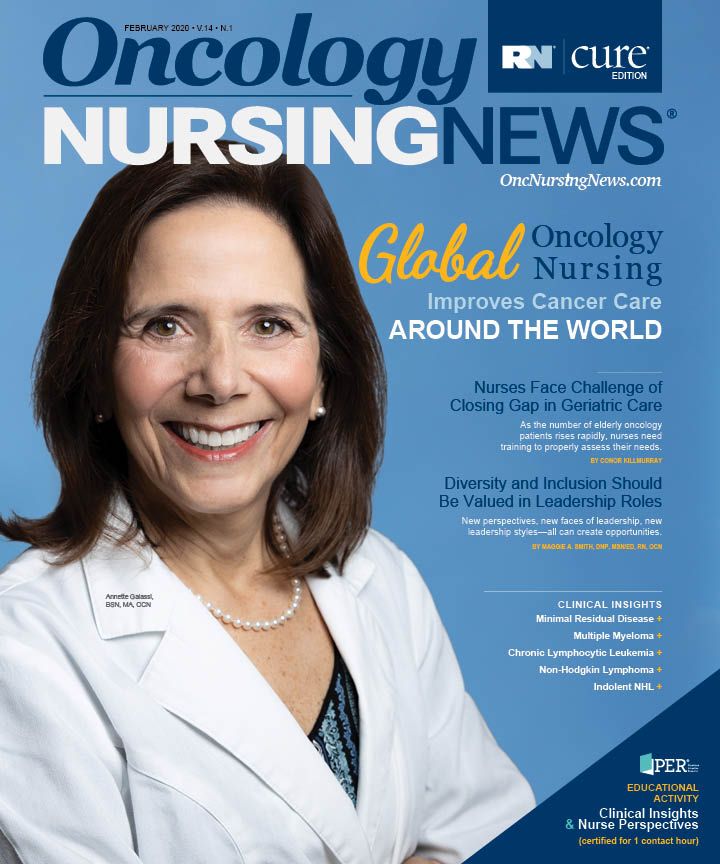Nurses, Set Goals in the New Year
"As nurses approach the future, a commitment to lifelong learning will be essential to remaining competent."
As we make our way into 2020, it is important to reflect on all the opportunities and achievements of last year. As oncology nurses, take a moment to exam your goals for professional and educational development. I challenge you to make this a year of professional growth geared to optimize the care you provide patients and families.
Did you know that, according to the Leukemia & Lymphoma Society, every 3 minutes, someone receives a diagnosis of a blood cancer, which accounts for 10% of all cancers? In 2019, an estimated 176,200 people were predicted to receive diagnoses of leukemia, lymphoma, and multiple myeloma. Among these cases, 56,770 were expected to die as a result of their disease.1
Given these statistics, conferences such as that of the American Society of Hematology (ASH) are held each year to educate clinicians and scientists working in the field of hematology. In December 2019, ASH celebrated its 61st anniversary, which included recognizing evolutions in acute and chronic leukemia, multiple myeloma, lymphoma, stem cell transplantation, chimeric antigen receptor (CAR) therapy, and many more.
The E. Donnall Thomas Lecture and Prize was awarded to Philip Greenberg, MD, for his research using T cells to treat patients with acute myelogenous leukemia (AML) and solid tumors. For over 3 decades, the only curative treatment for AML has been conventional chemotherapy and allogeneic transplantation. According to the National Cancer Institute, the 5-year survival of patients with AML is 27.4 %.2
Innovations such as adoptive cell therapy offer promising outcomes, given their selectivity to T-cell receptors.
Other exciting advancements in the field include the following:
Blinatumomab (Blincyto), a bispecific T-cell antibody, was proved to be effective in sustaining diseasefree survival, overall survival, and the ability to proceed to transplantation in relapsed/refractory (R/R) acute lymphoblastic leukemia.3
The bispecific humanized immunoglobulin that targets CD3 and CD20, mosunetuzumab, showed an overall response rate of 64.1% and a 42.2% complete remission rate in patients with indolent non-Hodgkin lymphoma who were re-treated with the agent after CAR T-cell therapy.4
A phase I study of CAR T-cell therapy for patients with R/R multiple myeloma showed a median response of 28.8 weeks.5
The field of oncology is rapidly expanding with clinical trials, newly approved pharmacological agents, and precision medicine. As nurses approach the future, a commitment to lifelong learning will be essential to remaining competent. We will need to provide multimodal teaching to ensure that patients understand their treatments, including adverse events. Patients and families depend on their nurses to be knowledgeable experts in their care.
The evolution of population health has expanded the settings in which oncology patients receive treatment. These settings include hospitals, outpatient clinics, and day treatment centers. It is essential that nurses anticipate the needs of patients who receive treatment in nontraditional settings. This includes offering comprehensive discharge instructions, providing emergency contact information, and discussing which symptoms to report. Given the advanced age and complexity of patents with cancer, ongoing reinforcement of the treatment plan is critical to minimizing complications that lead to increased mortality.
References
- Facts and Statistics. Leukemia & Lymphoma Society website.lls.org/facts-and-statistics/facts-and-statistics-overview/facts-and-statistics. Published 2019. Accessed January 3, 2020.
- Cancer stat facts: leukemia — acute myeloid leukemia. National Cancer Institute website. seer.cancer.gov/statfacts/html/amyl.html. Accessed January 3, 2020.
- Brown PA, Ji L, Xu X, et al. A randomized phase 3 trial of blinatumomab vs. chemotherapy as post-reinduction therapy in high and intermediate risk (HR/IR) first relapse of B-acute lymphoblastic leukemia (B-ALL) in children and adolescents/adults (AYAs) demonstrates superior efficacy and tolerability of blinatumomab: a report from Children’s Oncology Group Study AALL1331. Presented at: 61st American Society of Hematology Annual Meeting & Exposition; December 7-10, 2019; Orlando, FL. Abstract LBA_1. bit.ly/2LDMr7U.
- Schuster SJ, Bartlett NL, Assouline S, et al. Mosunetuzumab induces complete remissions in poor prognosis non-Hodgkin lymphoma patients, including those who are resistant to or relapsing after chimeric antigen receptor T-cell (CAR-T) therapies, and is active in treatment through multiple lines. Presented at: 61st American Society of Hematology Annual Meeting & Exposition; December 7-10, 2019; Orlando, FL. Abstract 6. ash.confex.com/ash/2019/webprogram/Paper123742.html.
- Li C, Mei H, Hu Y, et al. A bispecific CAR-T cell therapy targeting Bcma and CD38 for relapsed/refractory multiple myeloma: updated results from a phase 1 dose-climbing trial. Presented at: 61st American Society of Hematology Annual Meeting & Exposition; December 7-10, 2019; Orlando, FL. Abstract 930. bit.ly/38imXXG.
Innovative Program Reduces Nurse Turnover and Fosters Development
Published: September 12th 2024 | Updated: September 12th 2024The US Oncology Network (The Network) has developed one of the most comprehensive programs in the nation to support the professional development and retention of new oncology nurses.




